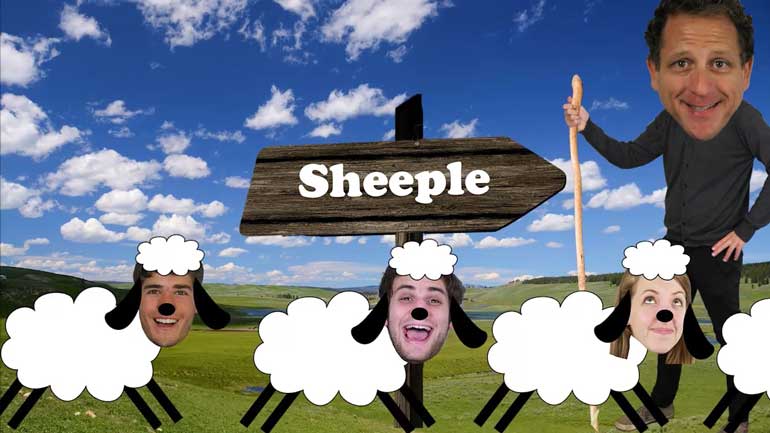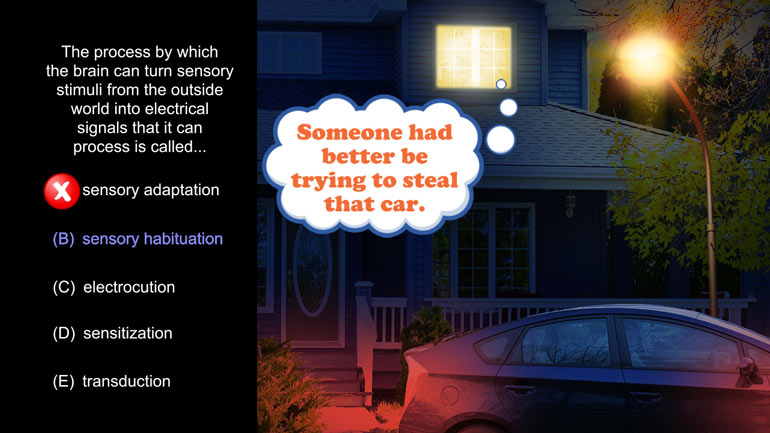ShmoopTube
Where Monty Python meets your 10th grade teacher.
Search Thousands of Shmoop Videos
AP Psychology 2.5 Social Psychology 23 Views
Share It!
Description:
AP Psychology 2.5 Social Psychology. Which of the following is a component of attitude?
Transcript
- 00:04
And here's your shmoop du jour brought to you by attitude
- 00:06
something that can perfectly be summed up in a single sassy hand gesture or uh [Man hand gesturing to a woman]
- 00:12
maybe two...Here's the question which of the following is a component of attitude
- 00:19
and here are potential answers.....Well we at shmoop like to think of attitude
- 00:26
as kind of like socks at Christmas it's something people always seem ready to [Mother gives sock to son for Christmas]
Full Transcript
- 00:30
give to others even though they'd hate to receive it themselves well
- 00:34
psychologically speaking attitudes are considered our evaluations of ideas evil [Angry face in persons brain and happy face appears]
- 00:39
people, objects or anything else in the world around us they're most often
- 00:43
positive or negative but can also sort of the dance in the gray area you know
- 00:48
it's just like socks one person's attitude may be that snakes are [A snake slithering on the ground]
- 00:51
disgusting another may think they're cute and cuddly a third might think
- 00:55
they're fascinating but just creepy.. Psychologists tend to think of attitudes
- 00:59
as having three major components all of which comprise the ABC model of attitude [ABC model of attitude diagram]
- 01:04
let's first go through the two components that aren't on our list of
- 01:07
potential answers beginning with A affective well this component refers to
- 01:12
the emotional aspect of an attitude if you see a colorful wig and are [Man looks angry when seeing a man wearing a pink wig]
- 01:16
immediately filled with blind rage this would explain the emotional component of
- 01:20
your aggressive attitude towards clowns the third component of attitude is
- 01:24
cognitive at C there, this describes the thoughts and beliefs one can hold
- 01:29
while sure you can have an emotional reaction to clowns that's angry but if [Man angrily thinking about clowns]
- 01:33
you'll also hold the belief that all clowns were a part of a secret clown
- 01:36
society that strive toward world domination then this extremely paranoid
- 01:42
belief would constitute the cognitive aspect of this attitude that leads us to
- 01:46
fill in the B in our ABC model of attitudes and judging by our answers
- 01:51
there's only one that fits the bill the behavioral component of your attitude
- 01:55
refers to the way in which one behaves when exposed to whatever it is they [Doctors giving a thumbs up]
- 01:59
formed an attitude about whether it's recoiling in fear at the sight of a
- 02:03
snake or tying up and interrogating a clown in order to find out exactly who [Man ties a guy up to interrogate him]
- 02:08
his clown leader is the component is all about action and it's the correct answer
- 02:13
to our question, but to be honest the
- 02:15
interrogation you know really isn't necessary the secret crown society
- 02:19
leader is clearly lady gaga - check out her meat.. [Lady Gaga covered in meat on top of the Earth]
Up Next
AP Psychology 2.2 Social Psychology. Which of the following was an independent variable manipulated in Asch's research?
Related Videos
AP Psychology 1.1 Personality. According to Freud, these three parts of personality are constantly in conflict.
AP Psychology 1.1 Sensation and Perception. The process by which the brain can turn sensory stimuli from the outside world into electrical signals...
AP Psychology 1.1 Social Psychology. Which of the following best describes social psychology?
AP Psychology 1.1 States of Consciousness. Who conducted research on REM sleep deprivations?




